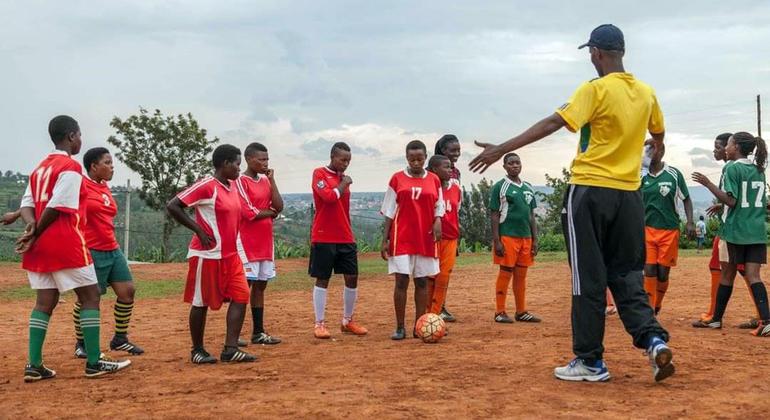In the early 1990s, Mr. Murangwa was a star player for Rayon Sports in Kigali, the capital of Rwanda. As a Tutsi, his life was in danger during the 100-day genocide in which over 800,000 people, mostly Tutsi, were killed. His status as a well-known footballer saved his life multiple times and inspired him to start the Ishami Foundation, which uses sports to promote tolerance and peace. Mr. Murangwa explained in an interview with UN News that he and his friends had no idea about the horrors that were about to unfold the day before the killings began.
On the day before the genocide began, Mr. Murangwa was training with his teammates in preparation for a game against a Kenyan team. After finishing early, they decided to watch African Nations Cup games. Mr. Murangwa went to a hotel near his apartment to watch the second game, which ended around 11 PM. As he was leaving the hotel, he heard people talking about an explosion at the airport where the Rwandan President’s plane had been shot down. Despite hearing explosions in Kigali before, Mr. Murangwa went home to sleep. He was woken up at 3 AM by heavy gunfire near his apartment and learned about the president’s death and the beginning of the killings from France International Radio.
One of the key reasons for Mr. Murangwa’s survival was a man named Jean-Marie Vianney Mudahinyuka, also known as Zuzu, who was a member of the ruling party’s militia group known as the Interahamwe. Zuzu was well-known at Rayon Sports and was known for his humor. When one of Mr. Murangwa’s teammates suggested that he seek protection from Zuzu, Mr. Murangwa was initially skeptical. However, Zuzu welcomed him with laughter and assured him of protection. This protection was crucial in ensuring Mr. Murangwa’s survival during the genocide.
During the genocide, Mr. Murangwa and other Tutsis were referred to as “cockroaches” by the perpetrators. It was commonly said, “First we will kill the cockroaches, then we will play football.” Despite the danger he faced, Mr. Murangwa’s background as a football player played a significant role in his survival. His association with Zuzu, a member of the Interahamwe, provided him with protection during the violent and chaotic period in Rwanda. This experience inspired Mr. Murangwa to establish the Ishami Foundation, an organization dedicated to using sports to promote tolerance and peace in communities affected by conflict.
Through the Ishami Foundation, Mr. Murangwa continues to use the power of sports to bring people together and foster understanding among different groups. His personal experience during the genocide drives his commitment to building a more peaceful and inclusive society through sports. By sharing his story and working to create positive change, Mr. Murangwa honors the memories of those who lost their lives during the tragic events in Rwanda. His resilience and determination serve as a powerful example of how sports can be a tool for healing and reconciliation in communities impacted by violence and conflict.









